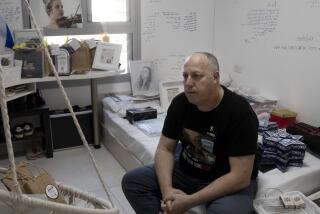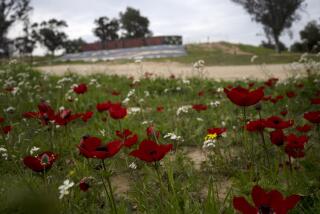Tears for Bride and Her Father Are Shed Over Graves in Israel
- Share via
JERUSALEM — This was supposed to be a time of joy for the Applebaum clan. The head of the family, David, had just returned from New York for daughter Nava’s wedding and took her out for a final evening together before the ceremony.
Relatives had flown in from far and wide. But instead of watching David beam with pride as Nava was married, family and friends buried both their broken bodies Wednesday morning, the prospect of deep happiness at new beginnings transmuted into ineffable grief over untimely ends.
Father and daughter had stepped out late Tuesday to a trendy Jerusalem cafe, a chance to talk before the nuptials. On a balmy summer night, the sidewalk tables brimming with customers, a Palestinian suicide bomber blew himself up at the coffeehouse, killing the Applebaums and five others.
It was the second suicide attack within less than six hours. The first one, near an army base outside Tel Aviv, killed eight people and the bomber.
On Wednesday, Israel was immersed in the all-too-familiar grief over more lives cut short: the army recruit and his girlfriend, who died hours apart from wounds sustained in the first blast; the young security guard whose attempt to keep the attacker from entering Cafe Hillel may have saved many of its patrons.
Amid so many portraits of horror and loss, however, the Applebaums’ deaths were especially bruising for this tiny country.
Not only had a wedding turned into a funeral, but David Applebaum was a noted and beloved doctor who headed the emergency room at a hospital here that regularly treats victims of suicide bombings. A pioneer in emergency care in Israel, the U.S.-born Applebaum had come home hours earlier from a New York symposium on medical responses to terrorist attacks, only to become the casualty of one himself.
“He would always rush off to receive and treat the injured from attacks, no matter what time of day or night,” said a friend, 49-year-old Zvi Pakter. “For someone who was always there to help the sick and needy to have been in such a helpless state in his last minutes is unimaginable -- indescribable.”
When Applebaum, 50, didn’t turn up at Shaare Zedek Medical Center to tend the wounded from Tuesday night’s explosion, the staff took notice. But no one guessed the worst until his family arrived, nearly hysterical with worry that father and daughter had gone to the targeted cafe, hospital director Jonathan Halevy said.
Then came word that a rescue worker at the bombing scene had recognized Applebaum’s body.
“He was the teacher of every ambulance driver and paramedic in this city. It’s no wonder that one of the paramedics identified him on the sidewalk,” said Halevy, who faced the grim task of informing the family.
Nava’s fiance, 19-year-old Hanan Sand, collapsed.
The young couple were to tie the knot Wednesday evening. When Halevy finally escorted the family home before dawn, on the family room table lay copies of a booklet that David Applebaum had prepared for the bride and groom, a compendium of familial advice and wisdom from Jewish sages on marriage and relationships.
An ordained Orthodox rabbi as well as a physician, Applebaum had written the first chapter himself.
“He was a very learned man,” Halevy said. “He was more of a Jewish scholar than some rabbis I know.”
Hundreds of mourners turned out for the Applebaums’ double funeral Wednesday morning, held under cloudless blue skies. Students who knew the 20-year-old Nava or one of her five siblings clutched one another, weeping. Her father’s colleagues shook their heads in disbelief. Overflow crowds clogged the driveway and clambered onto the roof of the funeral home to hear the eulogies and prayers being delivered inside and broadcast outside on loudspeakers.
“The Jewish people have lost a devoted daughter.... The Jewish people have lost one of [their] proud, loyal and courageous sons,” said Shimon Spiro, David Applebaum’s father-in-law. “The world of medicine has lost one of its most competent, one of its most creative, one of its most humane practitioners.”
“A father who takes his daughter for a last talk before her wedding -- [I wonder] what the content of that conversation was, what kind of spiritual guidance David gave Nava at the time of that gigantic explosion,” Halevy said in his eulogy.
Somberly, the crowd made its way to the cemetery, where the Applebaums were buried on a hilltop offering stunning views of the surrounding countryside.
Huddled toward the back, their shirts rent in mourning, David Applebaum’s wife, their two grown sons and three young daughters watched as the two shawl-wrapped bodies were lowered into the earth, first the daughter and then the father, while those around murmured, “God giveth and God taketh away.”
Sand, Nava’s fiance, who met her two years ago while both were volunteers with a cancer-patient support organization, stood close by.
By all accounts, the path of David Applebaum was a compassionate one that led him from Cleveland to Israel in 1981. To a person, friends and colleagues described him as a caring, warmhearted man who not only epitomized the humane physician but also revolutionized the provision of emergency care in Israel.
By opening urgent-care clinics where less-acutely ill patients could go, he relieved crowding in emergency rooms. By computerizing records and developing patient-tracking software, he reduced waiting time to see a doctor in the Shaare Zedek Medical Center emergency room by 60%, Halevy said.
And in a politically charged land where Jews and Arabs increasingly view each other with hostility and contempt, the bearded, bespectacled Applebaum insisted on treating Arab patients and took pride in having an ethnically mixed staff that pulled together as a team.
“He was truly one of a kind,” said Margalit Farhi, the head nurse at Shaare Zedek, where psychologists were on hand Wednesday to help staff members cope. “In spite of his senior status, he was always there for everyone. He was a man of great vision, always looking ahead, always sharing his vision, talking to everyone at eye level, never condescending.”
As Farhi spoke, a nearby patient said that Applebaum had saved her life.
“He saved so many lives,” Farhi said. “But last night, no one could save his.”
In addition to the Applebaums, several other victims of Tuesday’s two suicide bombings were buried Wednesday.
They included Alon Mizrahi, 22, who blocked the suicide bomber from getting farther into Cafe Hillel, and Yonatan Peleg, 21, a soldier who died in the explosion earlier Tuesday at a bus stop near an army base south of Tel Aviv.
Peleg’s girlfriend, 19-year-old Efrat Schwartzman, also was killed in that attack.
David Daniel Abistris, 51, was among those who died in the Jerusalem bombing. His son, Yinon, bade him an emotional farewell.
“I did nothing wrong. You did nothing wrong. No one did anything wrong, but still you were taken,” Yinon Abistris said. “Now all I have left from you is a message you left on my phone two days ago and a few photographs. And I find myself sitting here, listening to that one phone message over and over again.”
Malca Drazin, the great-aunt of Nava Applebaum’s fiance, flew in Tuesday from Canada to celebrate the wedding. She found herself standing in a cemetery instead.
“Who would ever believe this? Families should be here for good times and bad times.
“I’m sad I’m not at the wedding and that the tragedy occurred,” Drazin said in sadness, “but I’m glad to be ... in the land of Israel, with family.”
More to Read
Sign up for Essential California
The most important California stories and recommendations in your inbox every morning.
You may occasionally receive promotional content from the Los Angeles Times.














